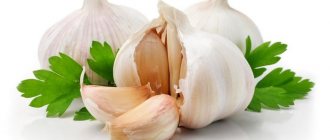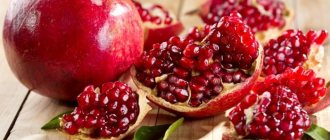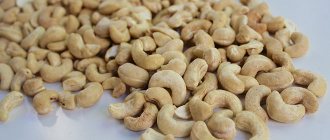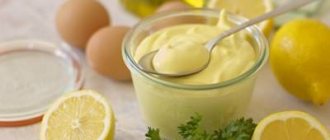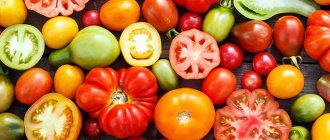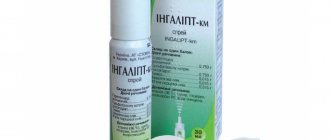Persimmons appear on sale in mid-autumn. She comes to us mainly from Armenia, Abkhazia, Azerbaijan and Turkey. Lovers of this fruit know how to choose ripe specimens, but inexperienced consumers are seduced by the beauty of unripe fruits and are disappointed by their tartness. We have to find out whether it is possible to eat persimmon while breastfeeding, and what beneficial properties it has.
Useful properties of the product
100 grams of persimmon contain 66 kcal, it contains a lot of fructose and glucose and satisfies hunger well. Orange fruits are fibrous and rich in sodium, calcium, potassium, iron and magnesium. The beneficial properties that have been scientifically proven are explained by the composition of the substances.
| Beneficial features | Description |
| Preservation of youth | All bright orange fruits and vegetables are loaded with beta-carotene, a powerful antioxidant. Persimmon during breastfeeding is useful for recovery after pregnancy, when hormonal changes occur in a woman’s body. There is more beta-carotene in this fruit than in bell peppers, pumpkin and tomatoes. |
| Prevention of kidney stones | Magnesium removes sodium salts and relieves the kidneys, preventing the formation of stones. Persimmon acts as a diuretic and tonic. |
| Normal heart function | There is so much potassium in the fruit that it can replace Valocordin. |
| Elasticity and strength of blood vessels | Vitamins C and P strengthen blood vessels. |
| Antibacterial agent | The bactericidal effect extends to Escherichia coli, hay bacilli, and Staphylococcus aureus. |
| Getting rid of diarrhea | Fresh fruits or a decoction of them help overcome even chronic diarrhea |
| Nervous system and hematopoiesis | Iron increases hemoglobin levels in the blood and calms the nervous system. |
| Cough medicine | If you can’t stop the cough after a cold, just gargle with a warm aqueous solution of juice several times. |
| Radiant skin | Masks made from pulp with egg yolk tighten pores, tone and soothe acne-prone skin. |
Medical opinion
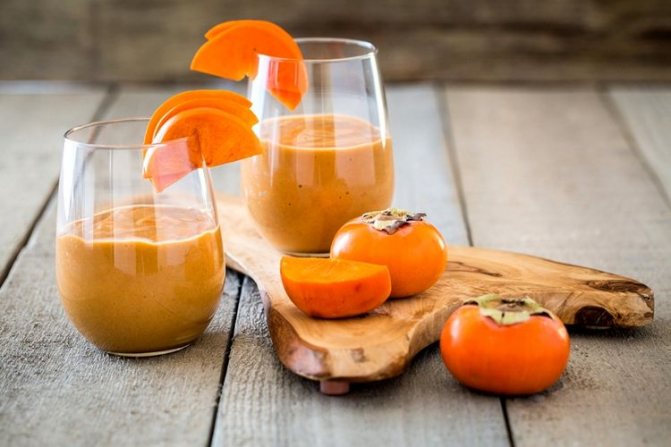
Since persimmons appear on sale during periods of shortage of other vegetables and fruits, they become a valuable source of vitamins and minerals. Natural vitamins and minerals allow you to restore the female body and properly form the infant.
Attention! The medical opinion on this matter is clear: persimmon is necessary for a nursing mother, but subject to the rules for introducing a new product.
Of course, only the woman herself can finally decide whether to eat or not, watching the child and herself. If there are no contraindications and the product is well tolerated, you should not give up the storehouse of useful microelements.
Is it possible to eat
This unique fruit restores the female body after losses associated with pregnancy and childbirth. The product is useful for the baby for the proper formation of the skeleton and preventing the development of rickets.
However, its introduction into the diet depends on the age and condition of the child. If a baby has a hypersensitive reaction to certain foods from birth, there is a high probability of allergies.
Recommended norm for breastfeeding
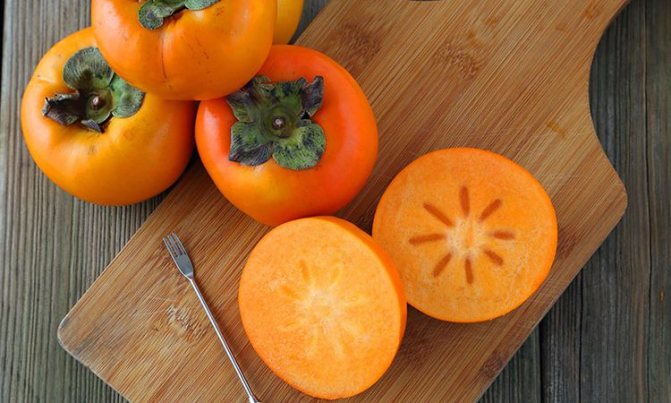
The first month of a baby’s life is the most difficult, since the digestive system is not fully formed. It is better to try a new product with one piece eaten in the morning.
In the second month, in the absence of a negative reaction, the amount of product eaten should not exceed 200g per day. No more than 2 fruits are allowed per week. Exceeding the dose is fraught with the development of constipation and colic in the baby.
After three months of age, dried persimmons can be introduced into the diet. The number of fresh fruits is increased to 2 per day, 3-4 per week.
On a note! If the child is very young and the season is coming to an end, you can keep the product frozen until the moment when the baby can eat it. Persimmon will not lose its nutritional properties for six months.
What is useful during lactation
A woman's diet during lactation should consist of foods that cannot harm the baby. Exotic fruits are at risk as allergenic, but if mother and child do not have food intolerance, persimmon will be useful during breastfeeding.
- The mother's immune system weakens after pregnancy. Persimmons contain a lot of ascorbic acid (vitamin C), which increases the body's defenses.
- Large calcium losses during pregnancy and feeding can be replenished with moderate consumption of fruits.
- Nicotinic acid (vitamin PP) makes hair thick and shiny, and gives the skin a healthy color.
- Iodine is needed for the thyroid gland to function properly.
- The sweetness of persimmons perfectly replaces candy, and the fruit contains no preservatives or dyes.
Persimmon does not have a direct effect on lactation, but it activates metabolism and helps to gain strength.
Effect on lactation

Doctors agree that the fetus does not have a particular effect on lactation, however, consumption of this berry slightly increases the production of breast milk, since it is 80% water. The combination of persimmon with warm tea is especially effective.
The fruit gives milk a sweetish taste due to its high fructose and glucose content. It has an indirect effect on children's digestion and normalizes the functioning of the digestive system during diarrhea. Microelements entering the child’s body have a positive effect on growth and formation.
Features of consuming persimmon during lactation
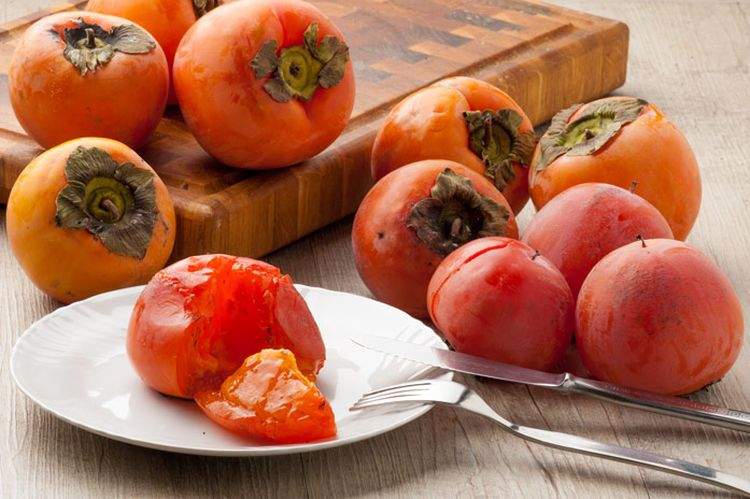
To avoid unpleasant consequences, a nursing mother is advised to adhere to some rules:
- The main danger is the high tannin content. Peeling the fruit from the peel will help neutralize it, since it is the main supplier of the astringent;
- to avoid stool retention, the fruit should be eaten after the main course, as a dessert;
- It is better to start introducing a new product with a few pieces eaten in the morning. This way, it’s easier to track the baby’s reaction.
On a note! Freezing the product helps eliminate viscosity. After defrosting, a slurry with a reduced tannin content is obtained.
Dried persimmon is the safest for health. It rarely gives allergic reactions and does not cause intestinal disorders. But the dried fruit has a higher calorie content, so the weekly dose should be less.
Can persimmons cause harm during breastfeeding?
The listed advantages allow us to answer in the affirmative the question whether a nursing mother can include persimmon in her diet. The fruit is useful if there are no contraindications and the child does not suffer from constipation and colic.
- Sweet fruits rich in glucose and fructose are not recommended for diabetes.
- Excessive consumption during breastfeeding leads to constipation in mother and baby.
- Often causes allergic reactions - skin rash and rhinitis. Even if the mother is not susceptible to allergies, the child in the first months of life is not ready for such tests.
There is an opinion that astringents will provoke the formation of adhesions in the intestines and constipation. In fact, the fiber from ripe fruits cleanses the intestines and acts as a mild laxative. The concentration of tannins decreases as they ripen; ripe fruits are not tart and do not cause constipation. However, exotic fruits should be introduced into the menu very carefully, as the reaction to them may be unexpected.
It is not necessary to give up delicious fruits when breastfeeding, but you can try the first teaspoon or slice when the baby is 4 months old - by this time his digestive system has formed.
It is advisable to time the introduction of this product to coincide with the start of complementary feeding. Eat a piece before your morning feeding and watch your baby throughout the day. If everything goes without complications, the portion can be increased slightly.
Provided that the child tolerated the new product well, the mother should limit herself to 200-300 grams of ripe persimmon per day.
Harm
You can eat persimmon while breastfeeding - it is not considered a strictly forbidden product.

But a pleasant-tasting “fruit” also has a number of disadvantages, which can lead to the following issues:
- mothers suffering from diabetes and obesity should refrain from exotic berries. A large amount of easily digestible sugars has a bad effect on the pancreas;
- excessive consumption of the product can provoke an outbreak of allergic reactions in infants;
- the astringent properties of the fruit (“tannins, which are poorly processed by the enzymes of the digestive tube are to blame”) can cause constipation in both a nursing woman and a baby.
You need to choose moderately ripe, soft and juicy berries without visible external damage. There are many varieties of persimmon that, unlike the classic ones, do not knit: “Korolek” (chocolate color), “Mandarin” (too sweet taste), “Bull’s Heart” (large and unsweetening), “Sharon” (crossed with an apple), “Chinese” (unsweetened) and others.
The best time to eat persimmons during lactation is considered to be the beginning of a new day: 1 berry eaten in the morning will allow you to monitor your baby and your own condition.
You can’t eat persimmons with protein foods, or combine them with milk and cold water: it will cause indigestion.
Which type of persimmon should a nursing mother choose?
Most Russians know that persimmons come in chocolate, king and orange varieties. Botanists divide varieties based on pollination, but for the consumer this characteristic is manifested only by the presence of seeds. The following varieties are available in our stores:
Chocolate Wren
Eating this variety of persimmon is a true pleasure. The wren is round and medium-sized, with brown flesh visible through the orange skin; the darker the fruit, the sweeter it is. This variety has a lot of seeds, it is juicy and not tart.
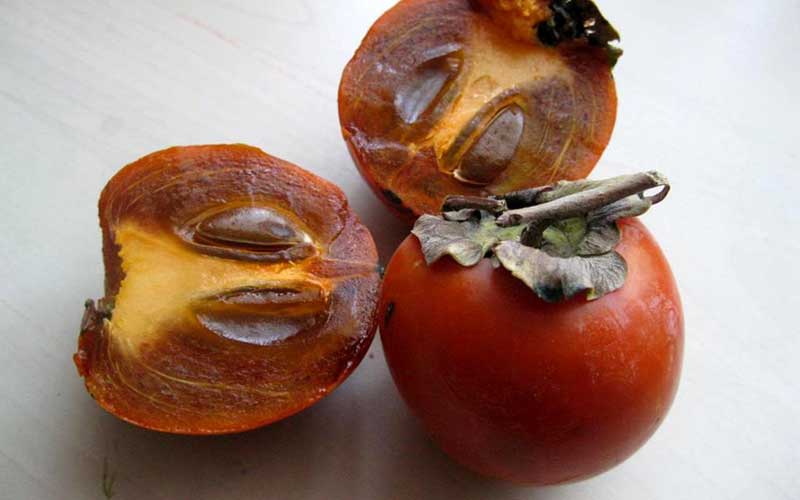
Large kinglet
There are large varieties with light brown or reddish flesh. When unripe, they are slightly astringent, but after ripening the astringency disappears.
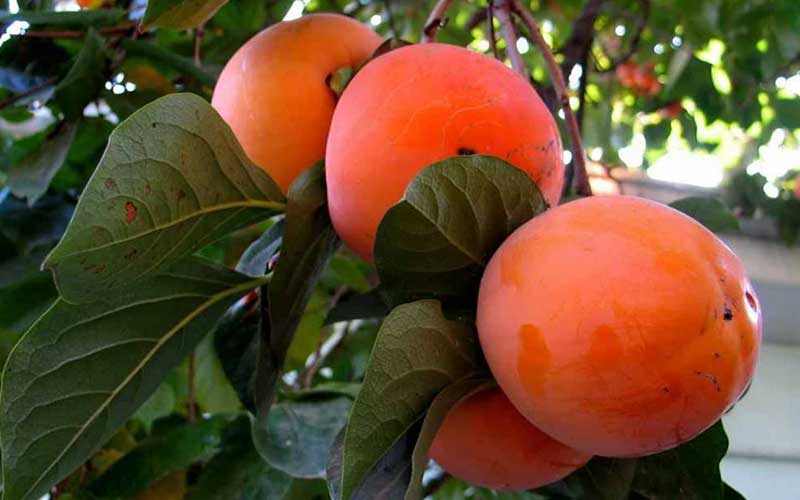
Early Kinglet
Persimmons are light inside and out and become jelly-like when ripe.
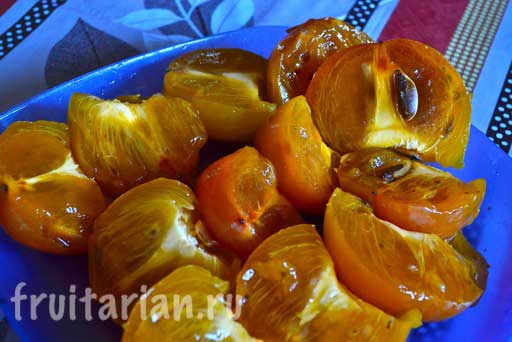
Tangerine
The shape resembles tangerines. Very sweet flesh of bright color, no seeds. Ripe tangerine persimmon resembles jelly.
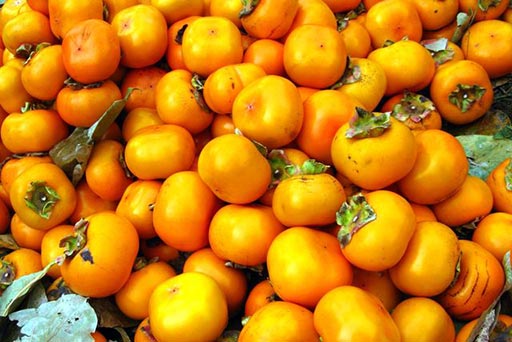
Tomato
A large variety, reminiscent of Bull's Heart tomatoes in shape and size. The pulp is orange, does not darken when ripe and becomes soft. Tomato persimmons are not as sweet as tangerine ones, and many people like it that way.
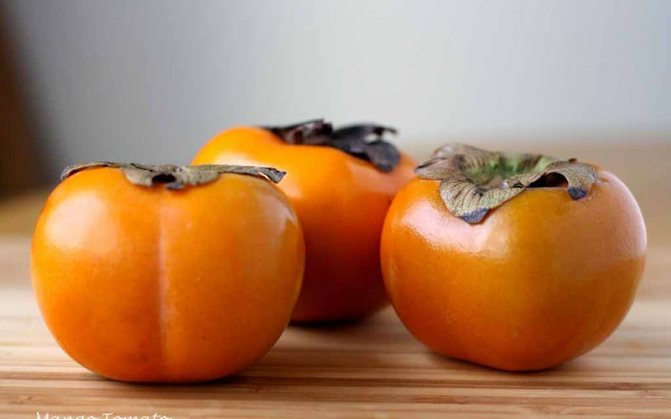
Sharon
A very sweet and not tart variety. You can recognize it by its slightly pointed shape.
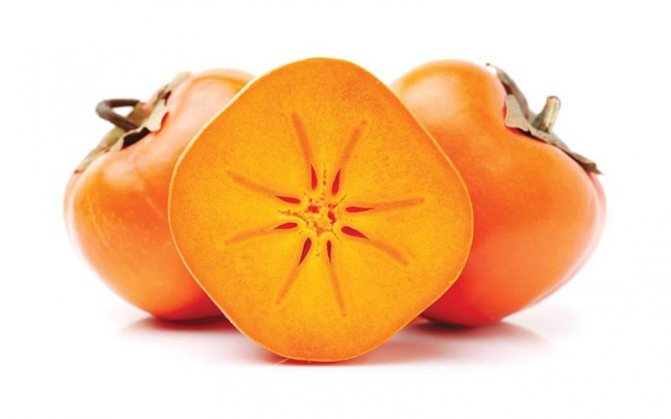
Fig
This variety ripens first. Fruits from Azerbaijan are very sweet, persimmons from China are almost bland. It can be with or without seeds, orange or chocolate.
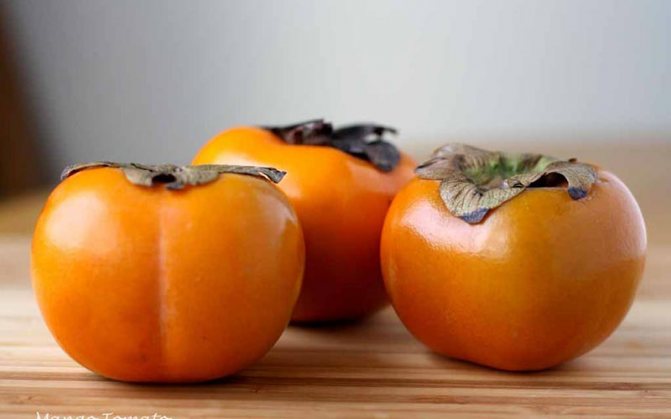
Regular
An eternally orange persimmon that never loses its tartness. This is the worst of the varieties.
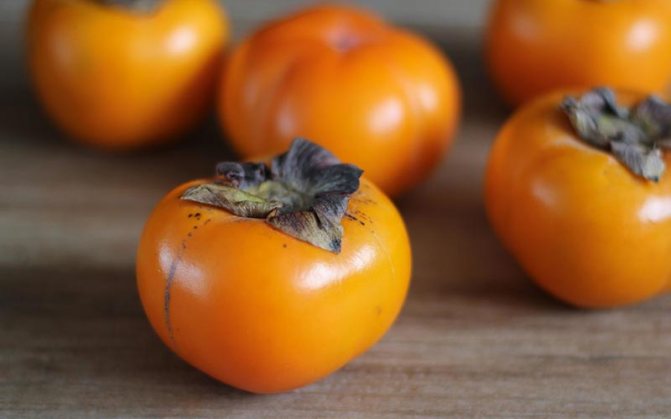
Chinese
Persimmons with a characteristic “stripe” are not sweet even when ripe. It has a tough skin.
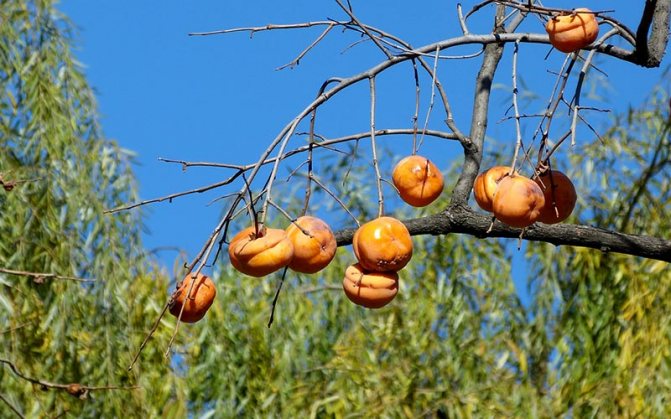
Egyptian
The fruits are elongated and taste like Chinese persimmons.
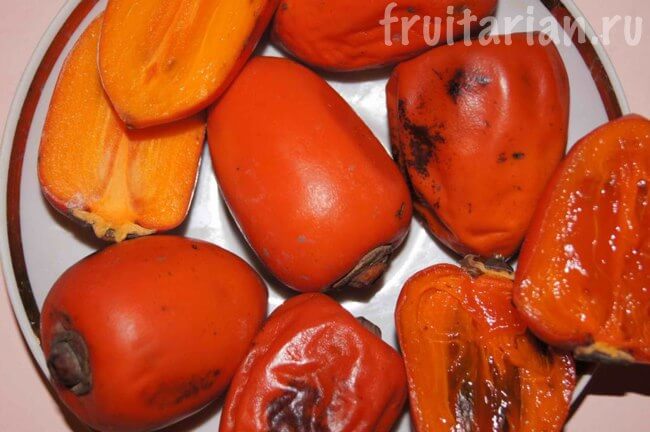
When choosing which variety is best to eat while breastfeeding, remember that tannins give persimmons astringency, which can cause constipation. Avoid eating unripe fruits and try to choose sweet varieties.
Persimmons or bananas: which is better?
Another berry and truly “food of the wise” is the banana. The high calorie content compared to persimmon does not make it less healthy. Contains: selenium, zinc, manganese and almost the entire group of B vitamins. But persimmon is the leader in the concentration of iron, iodine and other vitamins (A, E, C).
Bananas can be consumed in small quantities from the first month of breastfeeding (but better from 3 months). They are hypoallergenic. At the same time, they are able to charge the new mother with positivity for the whole day, promoting the production of joy hormones in the body.
If a nursing woman has an individual intolerance to persimmons, it is better to pay attention to fruits that are less aggressive for the gastrointestinal tract, with slow carbohydrates, low pectin content and allergens.
How to choose and store correctly
Persimmons ripen in late autumn, but the ripe fruits are transported. The harvest is harvested unripe, the fruits do not spoil for a long time and retain all the beneficial substances. When purchasing, try to choose fruits that can be eaten immediately or after a short time.
Signs of a ripe persimmon:
- Saturated color. Light coloring is characteristic of tasteless ordinary persimmons or unripe fruits.
- Smooth and thin skin. The right fruits appear amber, with the flesh visible through the skin.
- Sweet persimmons are usually covered with thin, dry fibers.
- Round dark spots indicate damage.
- Hard fruits are not ripe, but very soft ones are overripe - they need to be eaten immediately. Only Korolek can have a dense consistency.
- Dry and dark leaves on the fruit.
- Under the leaves the base is brownish, if it is bright orange the fruit will be tart.
- Dry stalk. Fruits ripened on a tree have a completely dried tail; if the crop ripened on the road, the fruit will be tart, but not very fragrant.
Place tart persimmons in a warm and dark place for a couple of days. The process can be speeded up if you put bananas or apples in the same bag. Express method - freezing for several hours.
Is it possible to breastfeed pomegranate?
You need to be very careful with red foods, because they can cause allergic reactions. If you have a great desire to consume pomegranate or pomegranate juice, then it is advisable to do this after 3-4 months of age. And again, they ate a couple of grains or took two sips, and watch the baby’s reaction. If your health remains normal, you can increase the dose. But do not eat one pomegranate every day, divide it into 4 - 5 days. If the baby is closer to a year old, then the dose can be increased, because pomegranate is very useful for its minerals and trace elements, it increases the level of hemoglobin, contains: potassium, calcium, magnesium, manganese, sodium and is also very tasty.
Persimmon mousse
A persimmon dessert will cheer up a nursing mother, benefit her and diversify the menu.
Ingredients:
- Yogurt – 200 ml
- Cream - 400 ml
- Three medium-sized sweet fruits
- Teaspoon lemon juice
- 50 g sugar
- 4 slabs of gelatin
Preparation:
- Soak gelatin in warm water
- Mix yogurt with sugar and lemon juice
- Drain the gelatin and heat it until completely dissolved, adding the yogurt and stirring. Leave for 10 minutes
- Remove seeds from persimmons and beat
- Whip the cream until foamy and mix with yogurt
- Pour the mixture of yogurt and cream and persimmon into the bowls in layers
- Leave it in the refrigerator for two to three hours
From this amount of products you will get 4-5 servings of mousse.
When not to eat persimmons
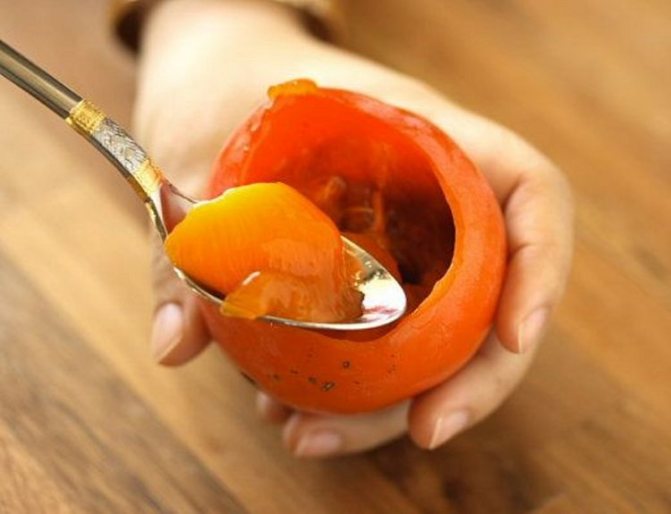
The product is absolutely contraindicated in case of allergic reactions: rash, rhinitis, swelling, diarrhea. Persimmon does not go well with protein foods. Therefore, it is not washed down with milk or added to yogurt.
For intestinal diseases, as well as after surgery on the gastrointestinal tract, the product is consumed in small quantities in the form of gruel. If you have gastritis, you should not eat this fruit on an empty stomach. Restrictions are necessary if there are stones in the gallbladder.
For diabetes mellitus, the amount and frequency of consumption must fit within the prescribed diet. In this case, the glucose content of other products should be taken into account.
Contraindications for use
- Persimmon is contraindicated after gastric surgery, after which peristalsis is impaired. Coarse fibers can form a clot and lead to intestinal obstruction.
- Tannins are dangerous for those suffering from stomach ulcers, kidney and liver problems.
- Sugars glucose and fructose in high concentrations are contraindicated in diabetes.
- If you are prone to constipation, it is better to avoid persimmons.
Persimmon is a tasty and healthy fruit, but during lactation it should be consumed very carefully. The substances are highly allergenic and can cause constipation in women and children. You can introduce the product into the diet in small portions and not earlier than the baby’s digestive system has formed. Carefully monitor your child’s reaction; if you have the slightest concern, stop using it until better times.
Click Share and make your friends happy!
Why are persimmons dangerous?
Despite its beneficial composition and important properties, persimmon can also cause a negative reaction in infants. It contains beta-carotene, which is a strong allergen. As a result, the child may develop allergic rhinitis, dermatitis, skin irritations, rashes and other types of allergies.
Persimmon contains tannins, which causes the viscosity of the fruit and can negatively affect the functioning of the stomach and intestines, kidneys and liver, especially in the presence of diseases of these organs. Tannins are difficult and take a long time to assimilate and digest, as a result, a newborn may experience indigestion and diarrhea or, conversely, constipation, vomiting and nausea, increased flatulence and colic in infants.
The large amount of sugar in the fruit is contraindicated for diabetics. In addition, it negatively affects the condition of the teeth and increases weight. Frequent consumption of persimmons and eating in large quantities will cause caries and destruction of dental tissue. In addition, this increases the load on the bladder and excretory system of the body. Let's find out how to properly eat persimmons during breastfeeding.

